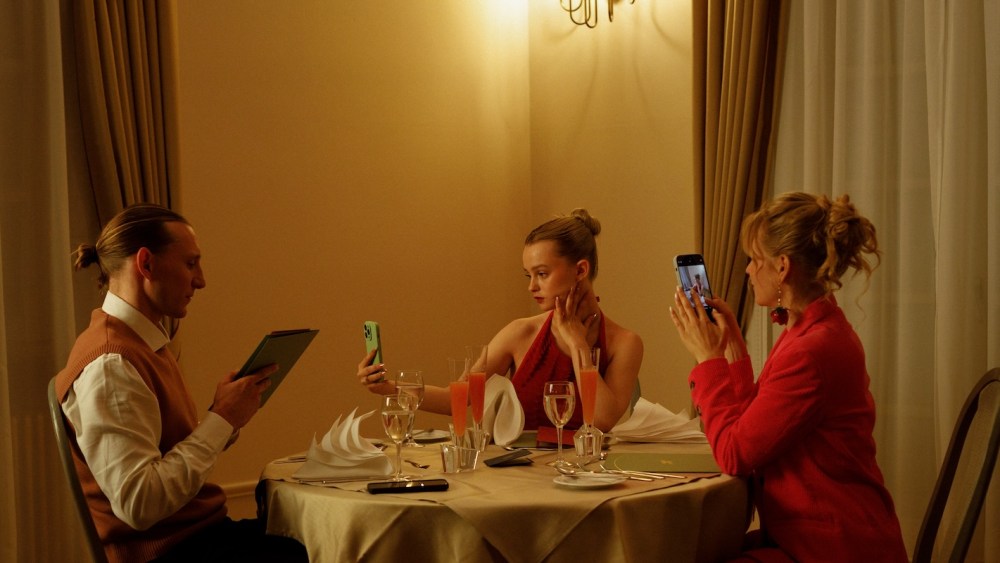It’s hard to say something deep about shallow people, a problem “Babystar” never fully gets past. Joscha Bongard’s debut narrative feature focuses on the only child of an influencer family whose public veneer of domestic perfection begins to crack when she reacts poorly to the prospect of an incoming new sibling.
There’s an inherent fascination to this kind of exhibitionist lifestyle that the film cannily exploits in its own sleek, advertising-like presentation. As well-crafted and acted as it is, however, the German “satirical drama” doesn’t quite transcend the conundrum of that description: It wants to critique commodified lives without ridiculing them, while unable to drum up much involvement or empathy for figures who don’t have much going on beneath the shiny surface. It’s an accomplished, watchable exercise that nonetheless ultimately affords minimal insight.
The Sommers are a nuclear trio inhabiting a tastefully ultra-modern if somewhat characterless home — everything within it no doubt provided by manufacturers seeking their approval — on a gated country property they seldom appear to leave. Forty-ish parents Stella (Bea Brocks) and Chris (Liliom Lewald) have apparently been marketing themselves since they were a childfree couple, as quasi-archival footage on their site shows us. And every step in the life of daughter Luca (Maja Bons), from conception to current 16-year-old status, has been duly shared with the world.
These three do seem affectionately interdependent. At the same time, there’s a weird, performative note to everything from shared grooming rituals to the way they say “I love you” as if mouthing a scripted catchphrase. When Luca has a sleepless night, she doesn’t count sheep, instead reciting the names of skincare products they’ve likely been paid to promote. The film opens with a visit from three kids thrilled to meet their idols, having presumably won a contest prize to do so. While the Sommers strike naturalistic postures and proclaim inspirational values, their young guests’ questions suggest they’ve absorbed quite different messages: They want to know about their hosts’ weight, wealth, clothing brands, openness to cosmetic surgery and so forth. (To one such query, mom airily responds, “Truly beautiful people require no correction.”)
Mostly fixated on their fitness regimes and social media profiles, the parents don’t appear to interact with any other adults beyond professional contacts. (Verena Altenberger gets one scene as the CEO of an AI company creating avatars of the family members for commercial sale.) When asked, Luca shrugs that she “doesn’t have time for friends,” let alone a boyfriend. Yet the hermetically sealed world she’s accustomed to springs a leak when mom feels her out about a prospective junior sibling.
The teen’s existential crisis at possibly “not being special” anymore drives what little narrative impetus arrives at midpoint. Her rebellion takes the form of leaving home for a hotel (where she blackmails management into giving her a luxe room), making blunt overtures toward the equally awkward desk clerk (Maximilian Mundt), and conducting a “fantastic family experiment” in which she basically auditions fans to see if they’d like to adopt her. Meanwhile, her parents frantically hide the rift from their audience.
The performers are admirably committed, with Bons (who looks rather like adolescent Reese Witherspoon) credible as a sort of media test-tube baby — perfectly formed on the outside, her internal development hobbled from lack of healthy exposure to average people’s reality. At one point, a subsidiary character calls her “soulless,” a harsh judgment, but not entirely inapt.
We’re meant to simultaneously be amused and moved by Luca’s plight. But even within the confines of this premise, Bongard (who previously made a similarly angled documentary, “Pornfluencer” aka “Verified Couple”) and co-writer Nicole Ruethers stay on a too-neutral surface, refusing either to have much fun at their characters’ expense or to probe deeply enough to make us care about them.
Our heroine is given a confidante (Joy Ewulu), but the nature of that woman’s interest and their relationship is kept murky. When Luca is meant to be taking a transformative leap at the end, to spare her new sibling the same under-microscope upbringing she had, there’s not much impact. The film is too reserved to have rendered vivid whatever damage her parents’ decisions have wrought on her. In a sense, “Babystar” is like an influencer-era version of “The Truman Show,” albeit with the highs and lows so smoothed out we don’t feel anything much at all. Laughter and tears are two emotions too extreme to be accessed here.
Still, if “Babystar” winds up a somewhat disappointingly mild, soft-pointed portrait of a dubious cultural phenomenon, it remains polished and well-paced enough to hold interest. The design contributions all nicely underline the notion of lives lived almost entirely for consumerism. Jonas Vogler’s ethereal choral score reminds us that these superficially nice, attractive people are nevertheless as artificial in their habitat as exotic species in a zoo cage.

